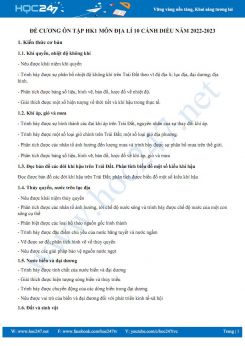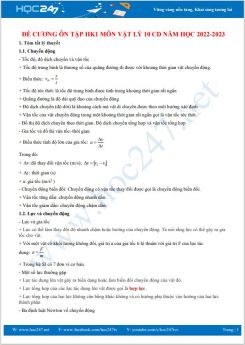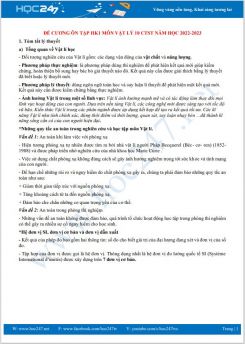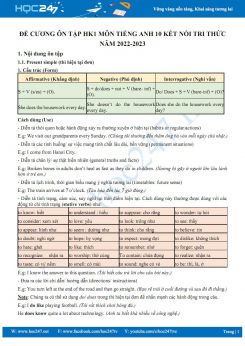Tiß║┐ng Anh 10 Ch├ón trß╗Øi s├Īng tß║Īo l├Ā mß╗Öt trong nhß╗»ng m├┤n hß╗Źc mß╗øi ─æŲ░ß╗Żc ├Īp dß╗źng giß║Żng dß║Īy trong thß╗Øi gian gß║¦n ─æ├óy vß╗øi nhiß╗üu chß╗¦ ─æß╗ü th├║ vß╗ŗ v├Ā kiß║┐n thß╗®c bß╗Ģ ├Łch. ─Éß╗ā gi├║p c├Īc em dß╗ģ d├Āng hŲĪn trong viß╗ćc ├┤n tß║Łp, hß╗ć thß╗æng kiß║┐n thß╗®c quan trß╗Źng c┼®ng nhŲ░ thß╗Ł sß╗®c m├¼nh trŲ░ß╗øc c├Īc dß║Īng b├Āi tß║Łp ngß╗» ph├Īp trŲ░ß╗øc b├Āi thi Hß╗Źc k├¼ 1 sß║»p ─æß║┐n, HOC247 xin giß╗øi thiß╗ću ─æß║┐n c├Īc em hß╗Źc sinh lß╗øp 10 nß╗Öi dung ─Éß╗ü cŲ░ŲĪng ├┤n tß║Łp HK1 m├┤n Tiß║┐ng Anh 10 Ch├ón trß╗Øi s├Īng tß║Īo n─ām 2022-2023. Ch├║c c├Īc em ├┤n tß║Łp tß╗æt v├Ā ─æß║Īt ─æŲ░ß╗Żc kß║┐t quß║Ż cao nh├®!
1. Nß╗Öi dung ├┤n tß║Łp
1.1. Tense Revision
Past simple: d├╣ng diß╗ģn tß║Ż c├Īc h├Ānh ─æß╗Öng diß╗ģn ra ß╗¤ qu├Ī khß╗® v├Ā kh├┤ng c├▓n li├¬n quan ─æß║┐n hiß╗ćn tß║Īi, thŲ░ß╗Øng d├╣ng ─æß╗ā kß╗ā lß║Īi c├Īc c├óu truyß╗ćn. Th├¼ qu├Ī khß╗® ─æŲĪn ─æŲ░ß╗Żc d├╣ng cho nhß╗»ng h├Ānh ─æß╗Öng ─æ├Ż ho├Ān tß║źt trong qu├Ī khß╗® ß╗¤ mß╗Öt thß╗Øi ─æiß╗ām nhß║źt ─æß╗ŗnh.
(+) S + V-ed/V2
(-) S + didn't + V nguyên mẫu (didn't = did not)
(?) Did + S + V nguyên mẫu?
Past continuous:
- Diß╗ģn tß║Ż mß╗Öt h├Ānh ─æß╗Öng xß║Ży ra tß║Īi mß╗Öt thß╗Øi ─æiß╗ām x├Īc ─æß╗ŗnh trong qu├Ī khß╗®.
- Sß╗▒ kß║┐t hß╗Żp giß╗»a qu├Ī khß╗® ─æŲĪn + qu├Ī khß╗® tiß║┐p diß╗ģn ─æß╗ā chß╗ē mß╗Öt h├Ānh ─æß╗Öng ─æang xß║Ży ra th├¼ h├Ānh ─æß╗Öng kh├Īc xen v├Āo. Sß╗▒ kß║┐t hß╗Żp cß╗¦a hai th├¼ qu├Ī khß╗® ─æŲĪn thŲ░ß╗Øng chß╗ē nhß╗»ng h├Ānh ─æß╗Öng liß╗ün nhau, tuß║¦n tß╗▒.
- Cß║źu tr├║c: While + qu├Ī khß╗® tiß║┐p diß╗ģn, qu├Ī khß╗® tiß║┐p diß╗ģn (diß╗ģn tß║Ż 2 h├Ānh ─æß╗Öng xß║Ży ra song song tß║Īi mß╗Öt thß╗Øi ─æiß╗ām trong qu├Ī khß╗®).
(+) S + was/ were + V-ing
(-) S + was/ were not + V-ing
(?) Ws/ were + S + V-ing?
1.2. Modal Verbs (Động từ khiếm khuyết)
- Must: ─æß╗ā n├│i vß╗ü thß╗® g├¼ ─æ├│ rß║źt cß║¦n thiß║┐t hoß║Ęc rß║źt quan trß╗Źng phß║Żi l├Ām
- MustnŌĆÖt: ─æß╗ā n├│i vß╗ü thß╗® g├¼ ─æ├│ bß╗ŗ cß║źm (mß╗Öt mß╗ćnh lß╗ćnh ti├¬u cß╗▒c)
- NeednŌĆÖt v├Ā donŌĆÖt have to ─æß╗ā n├│i vß╗ü thß╗® g├¼ ─æ├│ kh├┤ng cß║¦n thiß║┐t
- Should: d├╣ng ─æß╗ā ─æŲ░a ra lß╗Øi khuy├¬n
LŲ░u ├Į: Bß╗ŗ ─æß╗Öng vß╗øi ─æß╗Öng tß╗½ khiß║┐m khuyß║┐t: S + Modal Verbs + be + V-ed/V3
1.3. Articles
- Mß║Īo tß╗½ ŌĆ£aŌĆØ: ─æß╗®ng trŲ░ß╗øc danh tß╗½ ─æß║┐m ─æŲ░ß╗Żc, sß╗æ ├Łt v├Ā danh tß╗½ ─æ├│ phß║Żi bß║»t ─æß║¦u bß║▒ng mß╗Öt phß╗ź ├óm.
- Mß║Īo tß╗½ ŌĆ£anŌĆØ: ─Éß╗®ng trŲ░ß╗øc danh tß╗½ ─æß║┐m ─æŲ░ß╗Żc sß╗æ ├Łt v├Ā danh tß╗½ ─æ├│ bß║»t ─æß║¦u bß║▒ng mß╗Öt nguy├¬n ├óm (a,e,i,o,u).
- Mß║Īo tß╗½ "the":
- ─Éß╗®ng trŲ░ß╗øc mß╗Öt danh tß╗½ x├Īc ─æß╗ŗnh ─æ├Ż ─æŲ░ß╗Żc nhß║»c ß╗¤ ph├Ła trŲ░ß╗øc (ngŲ░ß╗Øi NGHE ─æ├Ż biß║┐t ─æŲ░ß╗Żc ─æß╗æi tŲ░ß╗Żng m├Ā ngŲ░ß╗Øi n├│i nhß║»c ─æß║┐n l├Ā g├¼)
- ─Éß╗®ng trŲ░ß╗øc mß╗Öt danh tß╗½ m├Ā sau danh tß╗½ ─æ├│ c├│ mß╗Öt mß╗ćnh ─æß╗ü hay cß╗źm tß╗½ theo sau l├Ām r├Ą ngh─®a.
- ─Éß╗®ng trŲ░ß╗øc c├Īc danh tß╗½ l├Ā chß╗ē ngŲ░ß╗Øi hoß║Ęc vß║Łt chß╗ē c├│ DUY NHß║żT.
- ─Éß╗®ng trŲ░ß╗øc mß╗Öt t├Łnh tß╗½ ─æß╗ā chß╗ē mß╗Öt cß╗Öng ─æß╗ōng ngŲ░ß╗Øi.
- ─Éß╗®ng trŲ░ß╗øc danh tß╗½ ri├¬ng chß╗ē Hß╗ī ß╗¤ dß║Īng sß╗æ nhiß╗üu ─æß╗ā n├│i ─æß║┐n cß║Ż vß╗Ż chß╗ōng hay cß║Ż gia ─æ├¼nh.
- Sß╗Ł dß╗źng trong cß║źu tr├║c so s├Īnh hŲĪn nhß║źt
1.4. Question words
- When? - Time ŌćÆ Hß╗Åi th├┤ng tin vß╗ü thß╗Øi gian
- Where? - Place ŌćÆ Hß╗Åi th├┤ng tin vß╗ü nŲĪi chß╗æn
- Who? - Person ŌćÆ Hß╗Åi th├┤ng tin vß╗ü ngŲ░ß╗Øi
- Why? - Reason ŌćÆ Hß╗Åi l├Į do
- How? - Manner ŌćÆ Hß╗Åi c├Īch thß╗®c, phŲ░ŲĪng thß╗®c
- What? ŌĆō Object / Idea / Action ŌćÆ Hß╗Åi vß╗ü vß║Łt / ├Į kiß║┐n / h├Ānh ─æß╗Öng
C├Īc tß╗½ kh├Īc c┼®ng c├│ thß╗ā ─æŲ░ß╗Żc sß╗Ł dß╗źng ─æß╗ā hß╗Åi c├Īc th├┤ng tin cß╗ź thß╗ā:
- Which (one)? - Choice of alternatives ŌćÆ Hß╗Åi th├┤ng tin vß╗ü sß╗▒ lß╗▒a chß╗Źn
- Whose? - Possession ŌćÆ Hß╗Åi th├┤ng tin vß╗ü sß╗¤ hß╗»u
- Whom? - Person (objective formal) ŌćÆ Hß╗Åi vß╗ü ngŲ░ß╗Øi (ß╗¤ dß║Īng t├ón ngß╗»)
- How much? - Price, amount (non-count) ŌćÆ Hß╗Åi vß╗ü gi├Ī cß║Ż, lŲ░ß╗Żng (kh├┤ng ─æß║┐m ─æŲ░ß╗Żc)
- How many? - Quantity (count) ŌćÆ Hß╗Åi vß╗ü lŲ░ß╗Żng (─æß║┐m ─æŲ░ß╗Żc)
- How long? - Duration ŌćÆ Hß╗Åi vß╗ü thß╗Øi gian
- How often? - Frequency ŌćÆ Hß╗Åi vß╗ü mß╗®c ─æß╗Ö thŲ░ß╗Øng xuy├¬n
- How far? - Distance ŌćÆ Hß╗Åi vß╗ü khoß║Żng c├Īch
- What kind (of)? - Description ŌćÆ Y├¬u cß║¦u m├┤ tß║Ż th├┤ng tin
1.5. Quantities
- Some + danh tß╗½ ─æß║┐m ─æŲ░ß╗Żc (sß╗æ nhiß╗üu) + V (chia ß╗¤ sß╗æ nhiß╗üu)
- Some + danh tß╗½ kh├┤ng ─æß║┐m ─æŲ░ß╗Żc + V (chia ß╗¤ sß╗æ ├Łt)
- Many: d├╣ng vß╗øi danh tß╗½ sß╗æ nhiß╗üu ─æß║┐m ─æŲ░ß╗Żc.
- Much: d├╣ng vß╗øi danh tß╗½ kh├┤ng ─æß║┐m ─æŲ░ß╗Żc.
- A lot of/ Lots of/ Plenty of/ A number of/ The number of + danh tß╗½ ─æß║┐m ─æŲ░ß╗Żc sß╗æ nhiß╗üu
- A lot of/ Lots of/ Plenty of/ A great deal of + danh tß╗½ kh├┤ng ─æß║┐m ─æŲ░ß╗Żc
- Little/ A little + danh tß╗½ kh├┤ng ─æß║┐m ─æŲ░ß╗Żc + V (chia ß╗¤ sß╗æ ├Łt)
- Few/ A few + danh tß╗½ ─æß║┐m ─æŲ░ß╗Żc sß╗æ nhiß╗üu + V (chia ß╗¤ sß╗æ nhiß╗üu)
- All + danh tß╗½ ─æß║┐m ─æŲ░ß╗Żc sß╗æ nhiß╗üu + V (chia ß╗¤ sß╗æ nhiß╗üu)
- All + danh tß╗½ kh├┤ng ─æß║┐m ─æŲ░ß╗Żc + V (chia ß╗¤ sß╗æ ├Łt)
- Any + danh tß╗½ ─æß║┐m ─æŲ░ß╗Żc sß╗æ nhiß╗üu + V (chia ß╗¤ sß╗æ nhiß╗üu)
- Any + danh tß╗½ kh├┤ng ─æß║┐m ─æŲ░ß╗Żc + V (chia ß╗¤ sß╗æ ├Łt)
- Most of/ All of/ Some of/ Many of + the/ his/ your/ her/ this/ those/ŌĆ” + danh tß╗½ sß╗æ nhiß╗üu + V (chia ß╗¤ sß╗æ nhiß╗üu)
1.6. Comparison
Comparative (So s├Īnh hŲĪn)
- Nß║┐u tß╗½ chß╗ē c├│ 1 ├óm tiß║┐t: ADJ/ADV + ─æu├┤i -er + than
- Nß║┐u tß╗½ c├│ 2 ├óm tiß║┐t trß╗¤ l├¬n: more + ADJ/ADV + than
- Mß╗Öt sß╗æ trŲ░ß╗Øng hß╗Żp ─æß║Ęc biß╗ćt:
- far ŌćÆ further / father
- good ŌćÆ better
- bad ŌćÆ worse
- ...
- Superlative Adjectives (T├Łnh tß╗½ so s├Īnh nhß║źt)
- Nß║┐u tß╗½ chß╗ē c├│ 1 ├óm tiß║┐t: the + ADJ/ADV + -est
- Nß║┐u tß╗½ c├│ 2 ├óm tiß║┐t trß╗¤ l├¬n: the + most + ADJ/ADV
- Too v├Ā Enough
- Too ─æß╗®ng trŲ░ß╗øc t├Łnh tß╗½
- Enough ─æß╗®ng trŲ░ß╗øc danh tß╗½ hoß║Ęc ─æß╗®ng sau t├Łnh tß╗½
- Ch├║ng ta thŲ░ß╗Øng sß╗Ł dß╗źng ─æß╗Öng tß╗½ nguy├¬n mß║½u theo sau hai cß║źu tr├║c: too + adjective hoß║Ęc adjective + enough.
2. B├Āi tß║Łp ├┤n tß║Łp
Exercise 1: Use the correct form of verbs in brackets.
1. In all the world, there (be) __________ only 14 mountains that (reach) __________above 8,000 meters.
2. He sometimes (come) __________ to see his parents.
3. When I (come) __________, she (leave) __________for Dalat ten minutes ago.
4. My grandfather never (fly) __________ in an airplane, and he has no intention of ever doing so.
5. We just (decide) __________ that we (undertake) ____________ the job.
6. He told me that he (take) __________ a trip to California the following week.
7. I knew that this road (be) __________ too narrow.
8. Right now I (attend) __________ class. Yesterday at this time I (attend) __________class.
9. Tomorrow I'm going to leave for home. When I (arrive) __________at the airport, Mary (wait) __________ for me.
10. Margaret was born in 1950. By last year, she (live) __________on this earth for 55 years .
11. The traffic was very heavy. By the time I (get) __________to Mary's party, everyone already (arrive) __________
12. I will graduate in June. I (see) __________ you in July. By the time I (see) __________ you , I (graduate) __________.
13. I (visit) __________ my uncle's home regularly when I (be) __________ a child.
14. That book (be) __________ on the table for weeks. You (not read) __________ it yet ?
15. David (wash) __________ his hands. He just (repair) __________ the TV set.
16. You (be) __________here before? Yes, I (spend) __________ my holidays here last year.
17. We never (meet) __________ him. We don't know what he (look) __________ like.
18. The car (be) __________ ready for him by the time he (come) __________tomorrow.
19. On arriving at home I (find) __________that she just (leave) __________a few minutes before.
20. When we (arrive) __________ in London tonight, it probably (rain) __________.
21. It (rain) __________ hard. We can't do anything until it (stop) __________
22. Last night we (watch) __________TV when the power (fail) __________.
23. That evening we (stay) __________up to talk about the town where he (live) __________for some years.
24. I (sit) __________down for a rest while the shoes (repair) __________.
25. Half way to the office Paul (turn) __________round and (go) __________back home because he (forget) __________to turn the gas off.
26. London (change) __________a lot since we first (come) __________ to live here.
27. While we (talk) __________on the phone the children (start) __________fighting and (break) __________a window
28. He used to talk to us for hours about all the interesting things he (do) __________ in his life.
29. You know she (stand) __________looking at that picture for the last twenty minutes.
30. I (spend) __________ a lot of time travelling since I (get) __________this new job.
31. When we (be) __________ at school we all (study) __________Latin.
32. When I (meet) __________ him , he (work) __________as a waiter for a year.
33. After he (finish) __________ breakfast he (sit) __________down to write some letters.
34. She (have) __________a hard life, but she's always smiling.
35. I think Jim (be) __________ out of town.
Exercise 2: Identify and correct mistakes in the following sentences.
1. Mary suggested to buy a new laptop computer.
2. Why do you dislike to watch TV with me?
3. Trying some of this wine. Maybe you will like it.
4. I am looking forward to see you soon.
5. She apologized me for the delay.
6. Did you have any trouble to buy a car?
7. It is a waste of time to go to the party.
8. I can't afford going on holiday.
9. Foreigners are not used to drive on the left.
10. I'm going to France learning French.
Exercise 3: Complete the text by putting the verbs in the correct form, using ing or to.
James has decided (1) _________(abandon) his second attempt at (2) __________ (swim) the English Channel after (3) ________(break) his ankle in a cycling accident. His decision (4) _______ (postpone) this attempt came after a two week holiday mountainbiking with his wife. His first attempt was also unsuccessful and he is unlikely (5) ___________ (be) back training for quite a few months. He said in a recent interview that he had not yet decided whether (6) _________ (try) one more time, but denies (7) ____ (lose) total interest in the project. 'I aim (8) ________ (raise) money for a local charity' he explained. He continued by (9) __________ (say) that if he could manage (10) ________ (find) the time, he would do a lot more charity work.
Exercise 4: Complete the second sentence so that it has similar meaning to the first.
1. You can try to get Jim to lend you his car, but you won't succeed.
There's no point_______________________________________.
2. He wished he had invited her to his birthday party.
He regretted_______________________________________ .
3. Mastering a second language takes time and patience.
It_______________________________________
4. After four years abroad, Mr. Brown returned home as an excellent engineer.
After Mr. Brown ____________________________________ .
5. It won't be difficult to get a ticket for the game.
You won't have any__________________________________________.
Exercise 5: Read the passage and write A, B, or C.
A: I spent the month of November 2015 volunteering in South Africa. For the first two weeks, I worked with 2 to 4 kids in grades 1 and 2 on Maths and literacy skills. I guided them and measured their progress so that other volunteers could take on my work after I left. For the last two weeks, I instructed the small kids to do personal hygiene and make toys. I had a lot of fun working with them.
B: Working with people living with HIV/AIDS is always emotionally and technically demanding. Before my volunteer trip to Ghana, I got training about HIV/AIDS. I worked with different groups of people. It was very emotional when I visited and played with children with HIV/AIDS in orphanages. I also visited schools, universities and households to give presentations and leaflets about HIV/AIDS. I had never felt
so helpful before. I can't wait for my next trips to other African countries.
C: My main duty was to provide financial advice for poor households in Kenya. I had to adapt myself immediately to the new weather, new people and new food there. Fortunately, my host family was the most selfless and encouraging people I'd ever known. I lived with three other volunteers, and the host family considered us as their daughters. I loved dinner time when all the family members gathered together and told jokes. Sometimes, I helped the children in the family with their homework. I feel so blessed I've known them in my life.
1. __________ mentioned a specific time of the day he/she enjoyed the most
2. _______ only worked with children
3. ________ told the specific time he/she did volunteer work
4. _________ helped people with problems related to money
5. _________ wished to go to other African countries
6. _________ his/her work was closely related to other volunteers'
7. __________ work worked with different groups of people
8. _________ felt that he/she was very helpful
9. _________ adapted himself/ herself quickly to a new environment
10. ________ taught children how to keep their bodies clean
11. _________ feel very lucky because of knowing some people
12. _________ helped someone with their homework
13. __________ mentioned training before his/her trip
14. ___________ accepted that his/her volunteer work is demanding
15. ___________ stayed with other volunteers in a same family
3. ─É├Īp ├Īn
Exercise 1: Use the correct form of verbs in brackets.
1. are - reach; 2. comes; 3. came - had left; 4. has never flown;
5. have just decided -would undertake; 6. would take; 7. was ;
8. am attending - was attending; 9. arrive -will be waitin;g 10. had lived;
11. got- had already arrived; 12. will see - see - will have graduated;
13. visited -was; 14. has been - havenŌĆÖt you read; 15. is washing - has just repaired;
16. Have you been - spent; 17. have never met - looks; 18. will have been- comes;
19. found ŌĆō had just lef;t 20. arrive ŌĆō will probably be raining; 21. is raining - stops;
22. were watching - failed ; 23. stayed ŌĆō had lived; 24. sat ŌĆō were being repaired;
25. turned ŌĆō went ŌĆō had forgotten; 26. has changed - came;
27. were talking ŌĆō started - broke; 28. had done 29. has been standing;
30. have spent - got; 31. were - studied; 32. met ŌĆō had been working;
33. had finished - sat; 34. has; 35. has been;
Exercise 2: Identify and correct mistakes in the following sentences.
1. to buy ŌćÆ buying; 6. to buy ŌćÆ buying
2. to watchŌćÆ watching; 7. to go ŌćÆ going
3. TryingŌćÆ Try; 8. going ŌćÆ togo
4. to seeŌćÆ to seeing; 9. to drive ŌćÆ to driving
5. apologized me ŌćÆ apologized to me; 10. learning ŌćÆ to learn
Exercise 3: Complete the text by putting the verbs in the correct form, using ing or to.
1. to abandon; 6. to try
2. swimming; 7. losing
3. breaking; 8. to raise
4. to postpone; 9. saying
5. to be; 10. to find
Exercise 4: Complete the second sentence so that it has similar meaning to the first.
1. There's no point in trying to get Jim to lend you his car.
2. He regretted not inviting/ not having invited her to his birthday party.
3. It takes time and patience to master a second language.
4. After Mr. Brown had been abroad for four years, he returned home as an excellent engineer.
5. You won't have any difficulty (in) getting a ticket for the game.
Exercise 5: Read the passage and write A, B, or C.
1. _____C_____ mentioned a specific time of the day he/she enjoyed the most
2. ___A____ only worked with children
3. ___A_____ told the specific time he/she did volunteer work
4. ____C_____ helped people with problems related to money
5. ____B_____ wished to go to other African countries
6. ____A_____ his/her work was closely related to other volunteers'
7. ____B______ work worked with different groups of people
8. ____B_____ felt that he/she was very helpful
9. ____C_____ adapted himself/ herself quickly to a new environment
10. ____A____ taught children how to keep their bodies clean
11. ____C_____ feel very lucky because of knowing some people
12. ____C_____ helped someone with their homework
13. ____B______ mentioned training before his/her trip
14. _____B______ accepted that his/her volunteer work is demanding
15. _____C______ stayed with other volunteers in a same family
Tr├¬n ─æ├óy l├Ā to├Ān bß╗Ö nß╗Öi dung t├Āi liß╗ću ─Éß╗ü cŲ░ŲĪng ├┤n tß║Łp HK1 m├┤n Tiß║┐ng Anh 10 Ch├ón trß╗Øi s├Īng tß║Īo n─ām 2022-2023. ─Éß╗ā xem th├¬m nhiß╗üu t├Āi liß╗ću tham khß║Żo hß╗»u ├Łch kh├Īc c├Īc em chß╗Źn chß╗®c n─āng xem online hoß║Ęc ─æ─āng nhß║Łp v├Āo trang hoc247.net ─æß╗ā tß║Żi t├Āi liß╗ću vß╗ü m├Īy t├Łnh.
Mß╗Øi c├Īc em tham khß║Żo t├Āi liß╗ću c├│ li├¬n quan:
- ─Éß╗ü cŲ░ŲĪng ├┤n tß║Łp HK1 m├┤n Tiß║┐ng Anh 10 KNTT n─ām 2022-2023
- ─Éß╗ü cŲ░ŲĪng ├┤n tß║Łp HK1 m├┤n Tiß║┐ng Anh 10 C├Īnh diß╗üu n─ām 2022-2023
Hy vß╗Źng t├Āi liß╗ću n├Āy sß║Į gi├║p c├Īc em hß╗Źc sinh ├┤n tß║Łp tß╗æt v├Ā ─æß║Īt th├Ānh t├Łch cao trong hß╗Źc tß║Łp.
T├Āi liß╗ću li├¬n quan
TŲ░ liß╗ću nß╗Ģi bß║Łt tuß║¦n
- Xem thêm













